Opeth's Mikael Åkerfeldt: 10 live albums that blew my mind
Prog maestro picks faves from his expansive record collection

MusicRadar's best of 2018: When the phone rings, Mikael Åkerfeldt is busy fixing up one of 11 chairs he recently acquired in an auction. It seems like a fitting past-time for a man who has furnished our ears with some of the most majestic and diverse musical portraits in recent times through his band’s work – a true modern-day master crafter.
“I was just finishing off some gluing,” reveals the Opeth leader, in between his duties attending premieres for new concert film Garden Of The Titans in his native Sweden. Filmed last year in the historic setting of Denver outdoor stronghold Red Rocks, the footage is every bit as mesmerising as you’d expect – mixing their more recent progressive hard rock crunch with the earth-conquering death metal that established them as game-changers in heavy music.
“We’ve played amphitheatres before, but when I think of them it’s usually a Greek/Roman empire kind of thing,” admits the singer/guitarist. “It can sometimes feel like you are playing in the middle of an antiques collection, but this one was cut into stone…
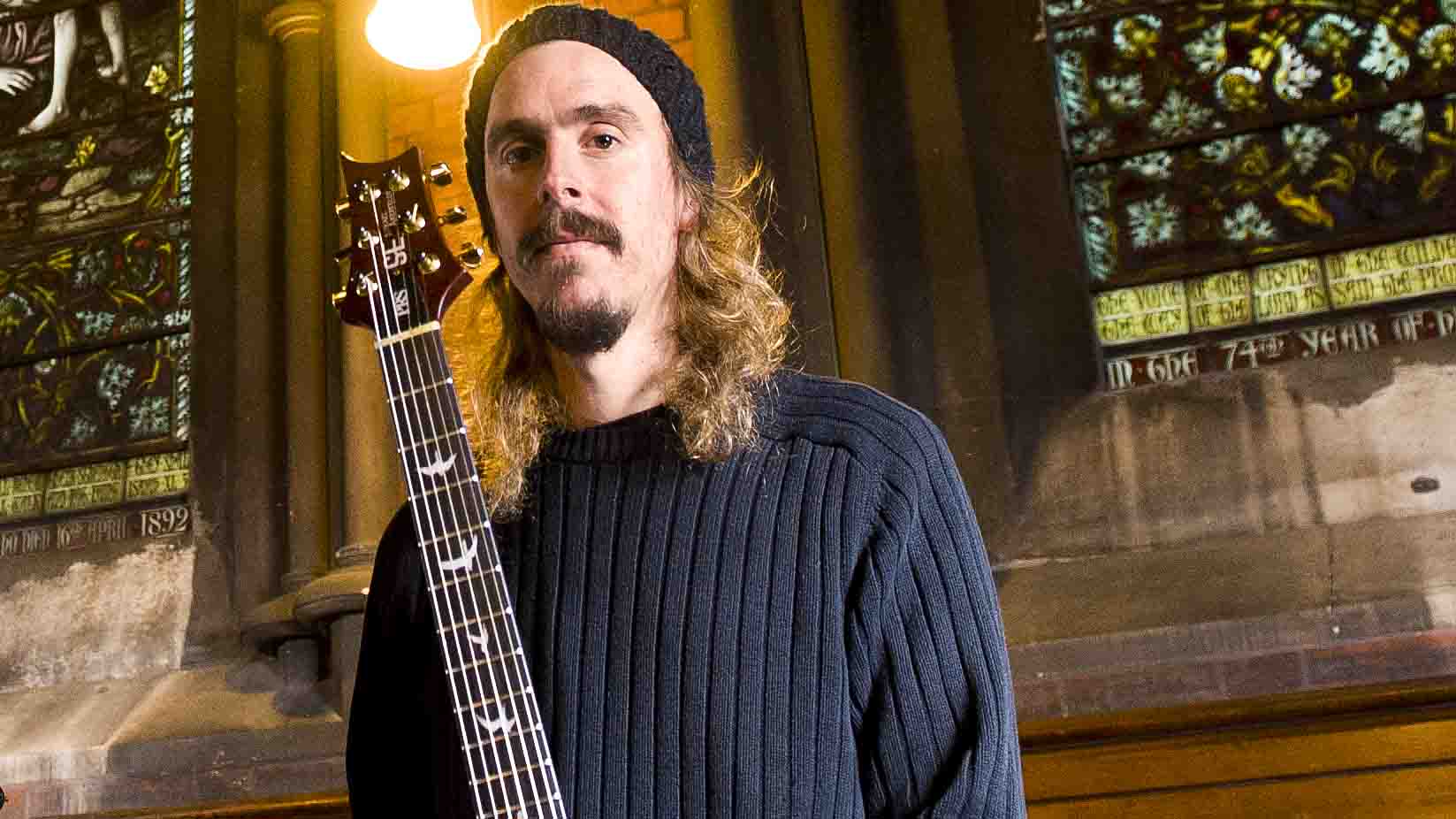
“It was beautiful up there. There are some places where you walk out and go, ‘Wow, that’s cool…’ It can almost have a relaxing effect. Like playing the Royal Albert Hall, the experience feels bigger than just playing songs. I don’t think they’d had many shows of that kind, showcasing our genre of music. I guess you could say it was a lot noisier than your average Red Rocks performance!”
That noise didn’t just come from the band, either – it’s one of those live recordings where you can sense the sheer amount of electricity in the air. Considering it was the band’s first live release not to be filmed in the UK, the American audience certainly did their best to make their presence felt…
“In America, crowds are loud,” says Mikael. “They are very expressive there! It’s like that in the UK too, actually; it’s like slight piss-taking and appreciation mixed together. I’ve found London crowds to be a lot louder, closer to the American audiences who are always like, ‘Fuck you… yeah!’ And to be honest, that makes the gig more fun. I always think, ‘Whoa, they’re alive out there!’ Sometimes when you play in Sweden, crowds are so reserved. There aren’t really any emotional outbursts, you don’t quite get that reaction. America is always loud, so it worked out well!”
The release marks the end of the quintet’s Sorceress album cycle, and naturally, attentions are turning to what will be their 13th full-length. For this bunch of progressive trailblazers, it’s full steam ahead.
“The songs are virtually done; we’ve picked a studio and who will engineer it,” teases Åkerfeldt. “The other people surrounding the recording haven’t been settled yet, but everything else is ready to go. As it looks, we are even going to rehearse a bit. We’re starting… very soon!”
Here, the Opeth mastermind picks his favourite live releases of all time…
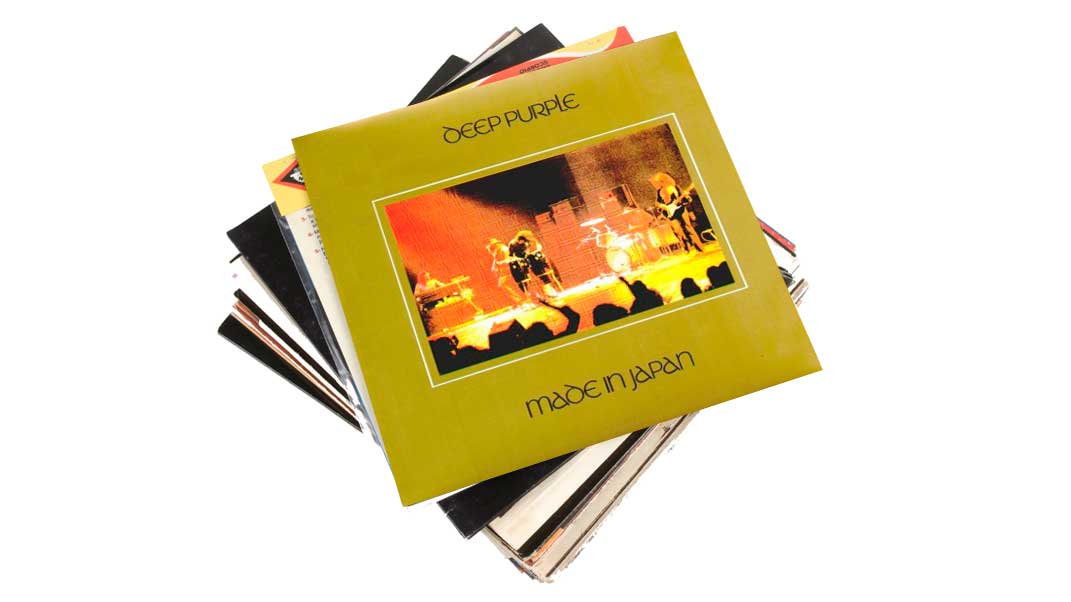
1. Deep Purple - Made In Japan (1972)
“Or as it was called in Japan, Live In Japan. That release actually had a picture on the sleeve that was actually from Japan, while the UK release had a picture of an old English venue called The Rainbow, which was obviously not in Japan! It’s the first that comes to mind because it’s fuckin’ awesome.
When Deep Purple are on top form, there is no other band that can rival that
“When Deep Purple are on top form, there is no other band that can rival that. You couldn’t put Led Zeppelin against Deep Purple on top form… they would disappear. And especially Black Sabbath, they wouldn’t stand a chance! It’s high energy at the top of its game.
“I think Ritchie Blackmore was at his best between 1970 and 1973. He made some fantastic records after that of course, some of which people might think were lacklustre, like Burn or Stormbringer. He still played great on those records, but maybe he was a little jaded.
“This version of Child In Time is my favourite; it’s what I put on when I’m in the mood to listen to that song. I actually found my first copy in a garbage heap, where people just dump their fuckin’ household rubbish. There was a stack of records with this on top… for some reason, I felt like a criminal for taking the whole pile so I didn’t. I’ve been upset with myself for not taking all of it ever since… because I’ll never know what else was there! But at least I got my first copy of Made In Japan.”
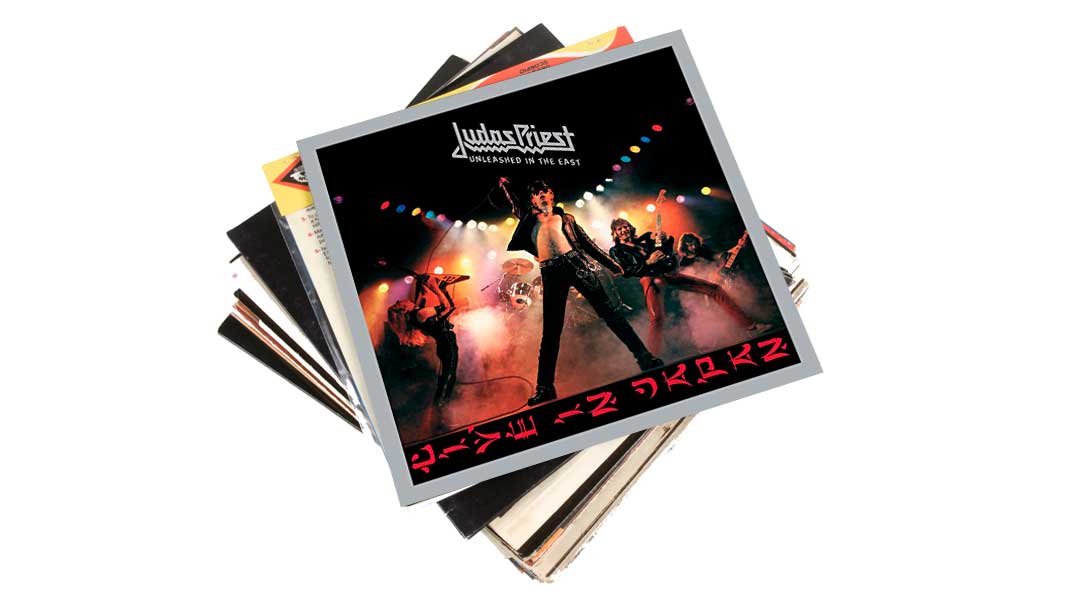
2. Judas Priest - Unleashed In The East (1979)
“Here’s another Japanese live record, and out there it was called Priest In The East. Both versions feature a seven-inch single that included four extra songs. I thought that was really amazing at the time, then years later I found out it was supposed to come out with those extra tracks... I have plenty of copies now, of course.
“It’s one of many live albums where it’s been disputed over how much was recorded live, but that doesn’t matter to me. They are still great versions. It has Les Binks on drums... if you know Judas Priest, you’ll know that he was the best drummer. I heard he was called a nickname ‘The Feather’ because he didn’t hit hard, but on this it sounds like he’s pummelling the shit out of those drums.
“There’s a slapback echo from the hall, too, so every hit sounds huge. The songs were generally played much faster, which made it sound even more energetic.”
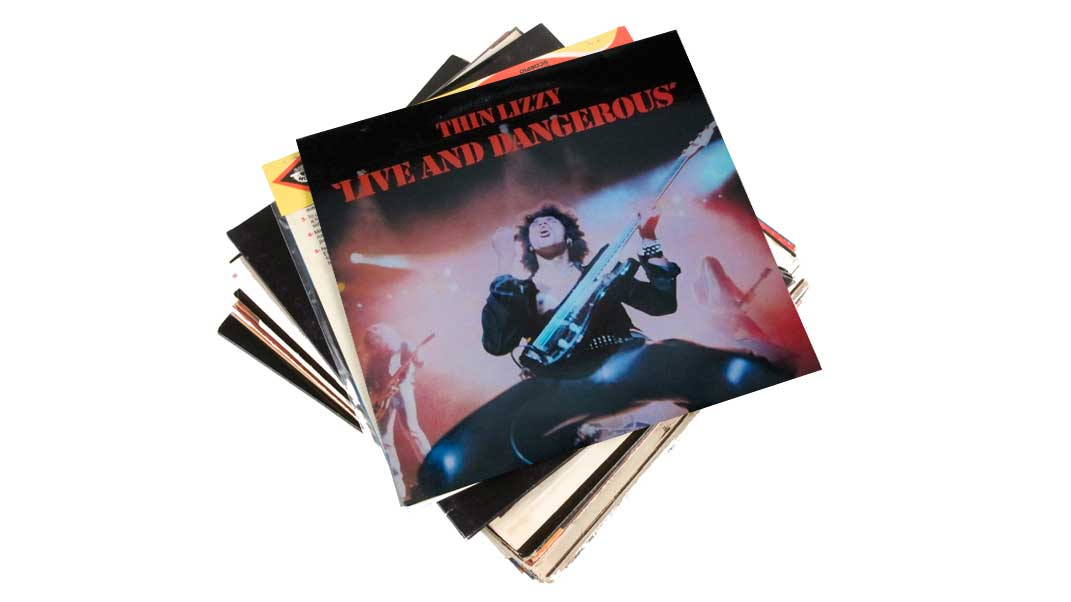
3. Thin Lizzy - Live And Dangerous (1978)
“This is another live release where it’s been disputed how much actually was live. I saw an interview in a Swedish magazine recently with Brian Downey, who I think is terrific and underrated drummer. When people wonder why they like Thin Lizzy, part of it has this muzak feel almost... it lures you in with this swing that Brian had more than anyone else from that era.
“Thin Lizzy were absolutely huge in Sweden, and in this interview Brian explained everything was live. It doesn’t really matter to me either way, these are great versions... like the song Still In Love With You, which has long guitar solos from Brian Robertson and Scott Gorham.
“We always go to see the Phil Lynott statue when we’re in Dublin, but last time he wasn’t there! There were rebuilding those streets and the statue was missing; I’m guessing he’ll be coming back when they’re finished. Like everyone else I’ve mentioned, these guys are my idols. Seeing a statue makes me think, ‘Wow… there’s that guy!’”
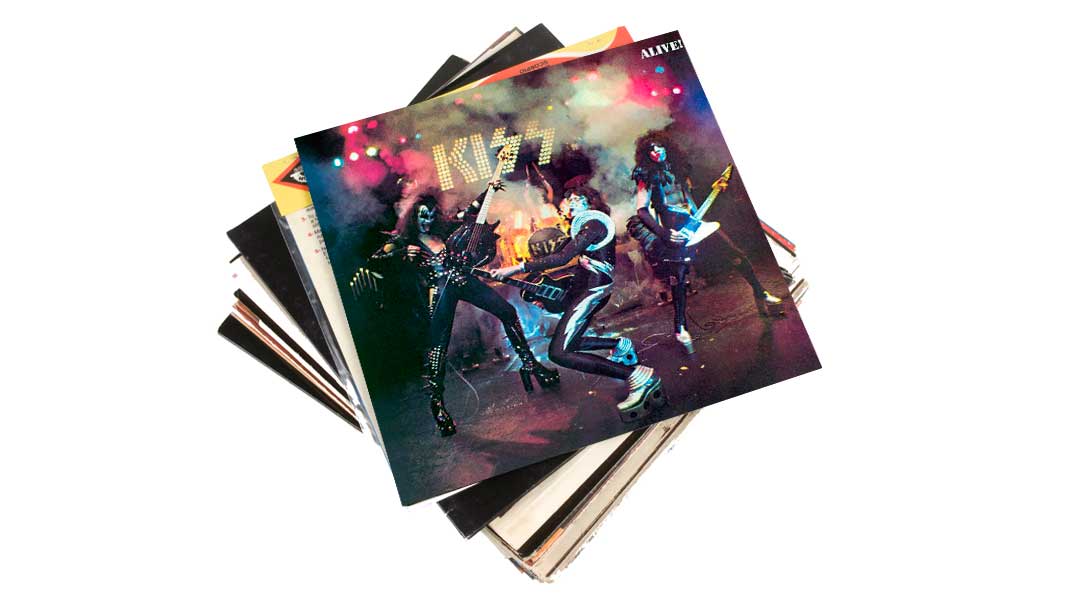
4. KISS - Alive! (1975)
“I’ve played this one so much, I can’t not mention it. For those of you into KISS history, or should I say KISStory, you’ll know that this was the record that made it happen for them. It was the combination of songs from the first three albums and off they went. The ‘You wanted the best, you got it – the hottest band in the land… KISS’ intro always made me lose my mind.
“I remember this record clearly, because I saw it performed live, but not by the band or in 1975 when it came out, haha! Where I grew up, the older kids on my street put on KISS makeup, selling popcorn and lemonade before performing KISS songs in the garage. It cost the equivalent of 50p to get in. That was amazing; I saw those guys after and looked at them like they were the actual members, like superheroes.
“So I got this and it had a massive impact on me, along with their debut. You might not put on KISS today and expect people to go wild because the music is more like boogie-rock… but back then, they were something unique to kids growing up, and very important for hard-rock kids of my generation. It had a lot to do with the facepaint, too, I guess!”
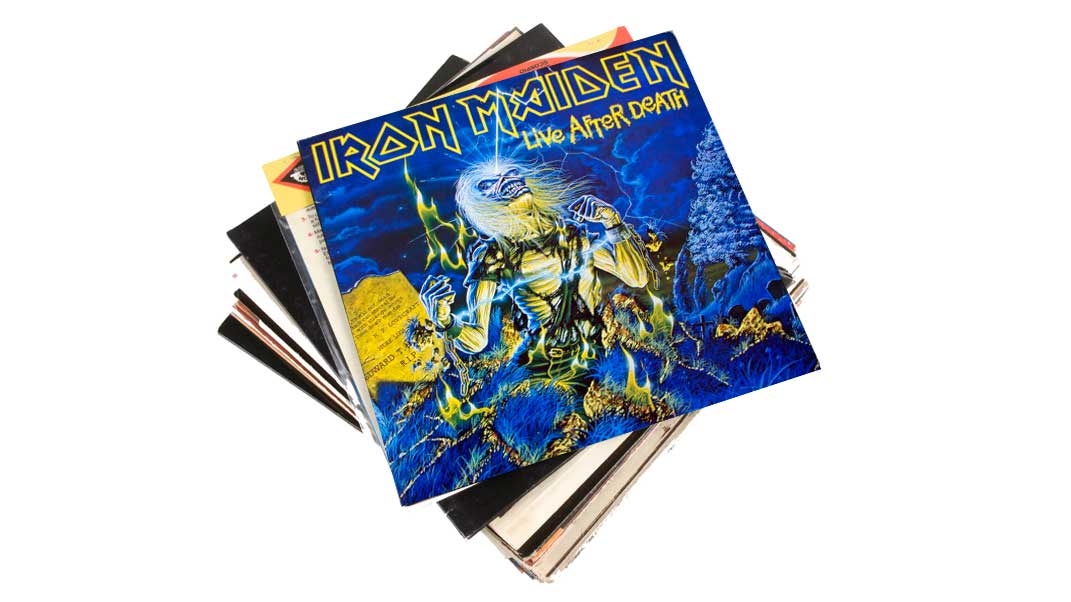
5. Iron Maiden - Live After Death (1985)
“I remember the day I bought this. It was 1985, and I had enough money to buy one record in my pocket. It was this or Venom’s Possessed. I went with Maiden, because it was a double album and the price was the same – it had the booklet, gatefold sleeve, and ultimately Maiden were a better band than Venom.
“Opening for them in Gothenburg a few years ago was a dream come true. It was their show, instead of a festival, so it felt more accurate to say we’d played with them because they’d picked us personally. I was well chuffed they actually knew about us! We’d been off-tour for quite some time, we were feeling rusty and nervous – it being the first show in seven or eight months. It felt like a trial by fire to go up in front of 60,000 people, but it went well…”
Maiden were clearly progheads, which is why I’ve always loved them!
“Obviously everyone comes for Maiden. No one will ever say they thought the support band was better, so all we could do was bask in the sunlight of Iron Maiden… so that’s what we did. I have many special memories with that band – I was interviewed by Bruce Dickinson for his BBC radio show before we played the Royal Albert Hall. Him – my hero – interviewing me about my band, not the other way round. It was too big to comprehend.
“Bruce is quite into prog I think, which is another thing that connects our bands. I’ve always dreamt about Steve Harris’s record collection. I heard somewhere that he might sell it, I’d love to know what originals are in there. Those guys covered Cross-Eyed Mary by Jethro Tull, a couple of songs by Montrose and this other weird band called Beckett who wrote A Rainbow’s Gold, which they covered. Maiden were clearly progheads, which is why I’ve always loved them!”
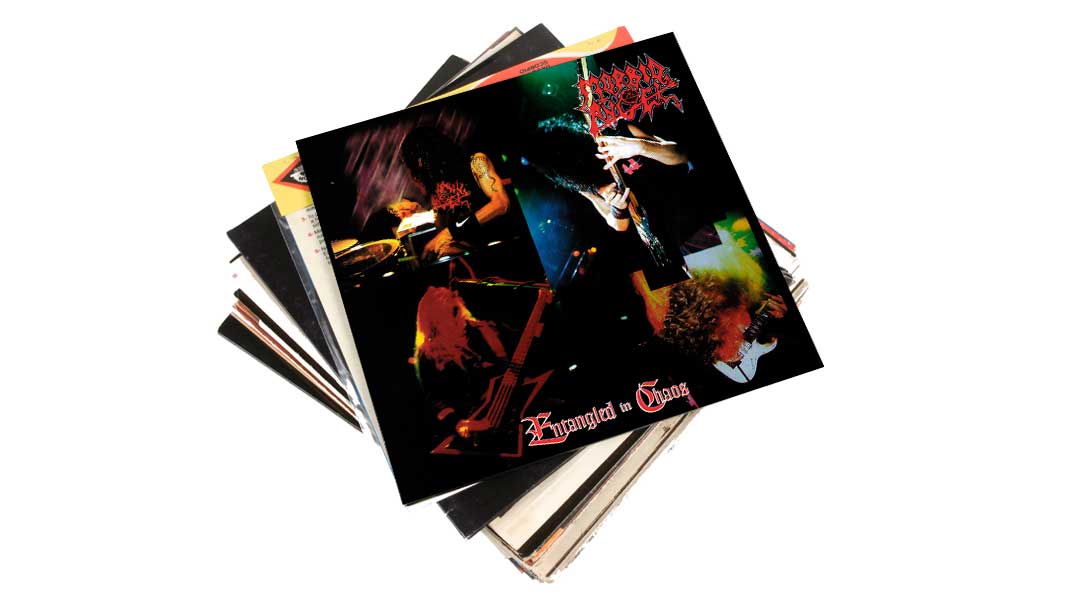
6. Morbid Angel - Entangled In Chaos (1996)
“We supported Morbid Angel on this tour, on this show, if I remember correctly. We had put out our second album Morningrise and it was our second overseas run, so we were very green but also a little bit cocky. In those days, we thought we were on to something unique – and yeah, in hindsight I think we were, because we didn’t sound like other bands.
We felt we would crush them… and they blasted us away in a couple of seconds
“We were playing with, yes, my favourite death-metal band of all time, but we thought they were old fucks because we were younger and had this new sound. It was like Iron Maiden opening for KISS in 1980. KISS were on the way down and Maiden just had their debut come out. That’s how we felt… we would crush them. I’m ashamed and blushing to admit it, but that’s how we felt.
“And they blasted us away in a couple of seconds. We had Morningrise, which sounded like distorted medieval minstrel music, and they started with Dawn Of The Angry [hums riff]. We couldn’t believe it and felt embarrassed… how could we think we were any kind of competition for them?! David Vincent’s vocals were on top form. Trey Azagthoth was like a spider bending over his guitar doing these weird riffs. Pete Sandoval had to take pauses during their brief intros in order to stretch and get ready for the next blastbeat.
“It put us back in our place, which was very good in retrospect. That recording summarises them that their peak – the end of that string of four amazing records before David Vincent left the band and, as far as I’m concerned, it wasn’t the same after.
“It was a swansong, to a certain extent… and what a swansong! The mixing of it was totally wild, too; the records were tighter and compressed with everything in order, this was like a cross between that control and their early demo tapes. It was glorious. I still put it on every now and then.”
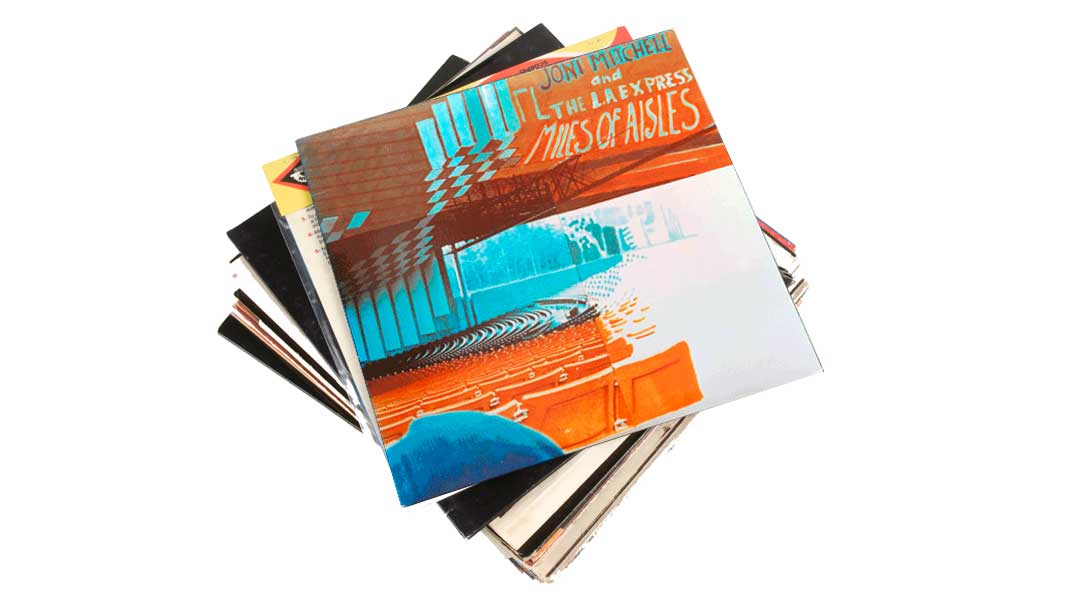
7. Joni Mitchell - Miles Of Aisles (1974)
“I’m a big fan of Joni Mitchell, though I think I only have this and one other of her live releases, Shadows And Light. She was touring Court And Spark around that time, and it’s just a great performance of that band-led era.
“I like watching live clips of her from that tour on YouTube, around 1974 or 1975 when she had her first band record with top players. I think Robben Ford was in that group; it had those types of cats.
“It’s a beautiful live performance and there’s something about how she would express her lyrics. It would almost be better for DVD, which is a shame because as far as I know there is no entire footage of that show. The versions of A Case Of You and Blue, both off her Blue record, are so good it makes you cry. That’s how good she was!
“I try to get people into Joni Mitchell all the time, and it’s actually quite difficult. Maybe it’s because I hang around with hard-rock people who get annoyed with singer-songwriters!”
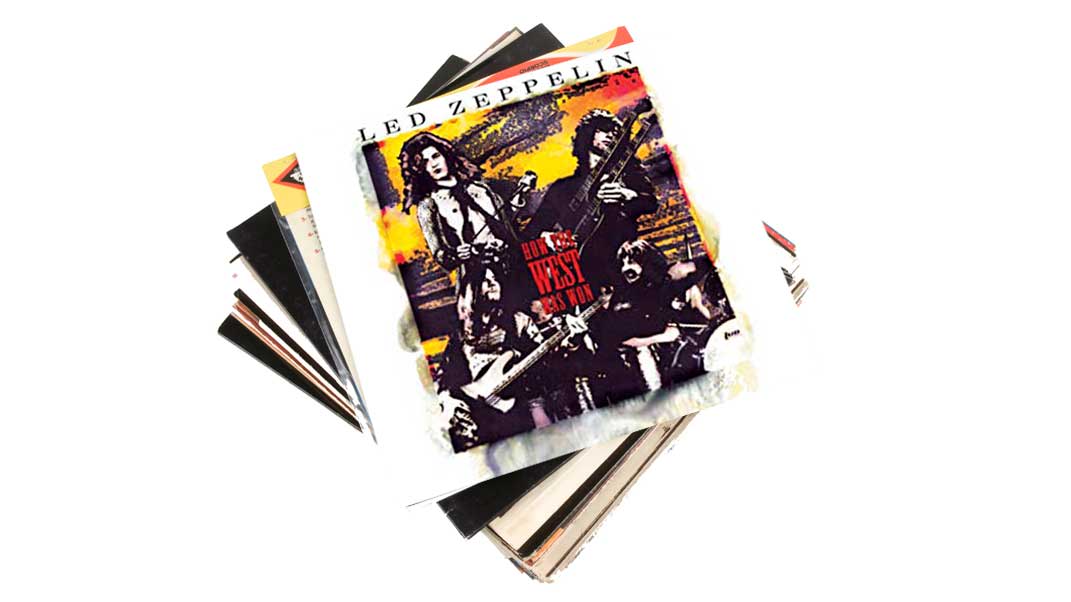
8. Led Zeppelin - How The West Was Won (2003)
“Just yesterday, I received the recent boxset of How The West Was Won. I haven’t played it yet but had a CD of it before. The way it starts with Immigrant Song is just so loud and magical! Those classic rock bands were untouchable when it came to magic… Jimmy Page, especially.
“He was very hit or miss; some nights he’d be insane, and some nights he’d be a bit more sloppy. I don’t have a strong opinion on either, but a lot of the time it would fall perfectly in the middle. He wasn’t as technically advanced as other players, but some of them would often ruin that loose spirit. I think musicians can be too slick – especially when it comes to live albums. Sometimes it’s fun to hear things change a bit live. Like hearing Mahavishnu Orchestra live recordings; they can be really fun and wild and actually quite noisy.
“I still think my favourite version of Stairway To Heaven is off The Song Remains The Same which was filmed a few years after it had come out. It was already very popular, so the crowd reaction is immediate. You get shivers before the song even starts; the crowd go fucking mental – which they don’t quite do on this version.”
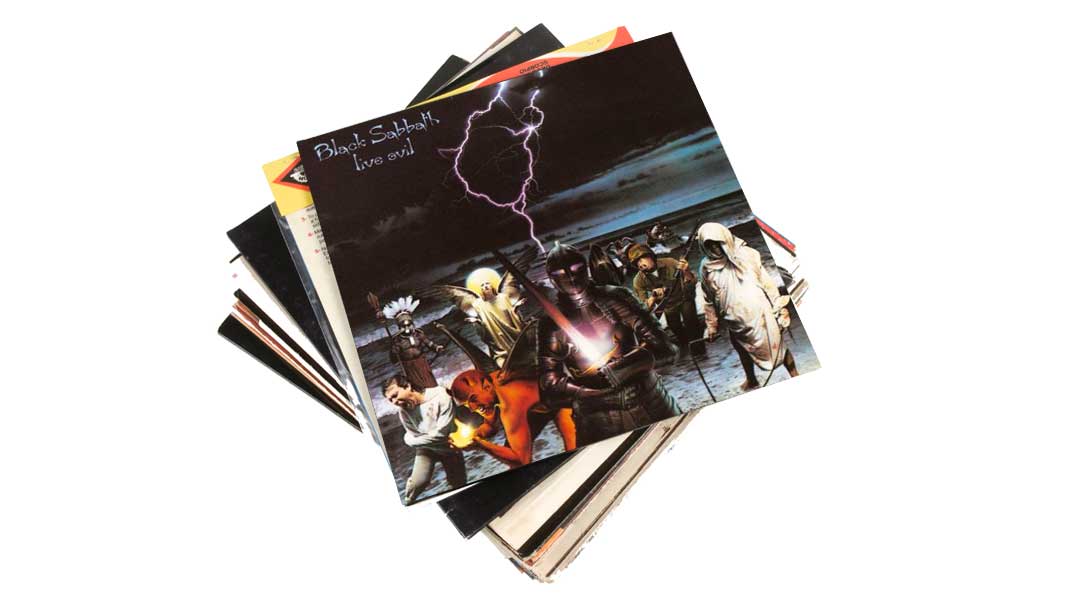
9. Black Sabbath - Live Evil (1982)
“I have a lot of hard-rock live records. This one was recorded after Mob Rules and is another swansong of sorts, before Dio left Sabbath.
“It sounds weird to say this, but I never really liked Dio singing Ozzy songs. He was a far superior singer, but the defenders of Black Sabbath Mk1 are probably right: nobody could replace Ozzy, even if he wasn’t the greatest singer they had. But those classic Dio-era tracks, even the version of Children Of The Sea alone, makes this a live album worth having.
“For me, those early songs were all about those four original guys, which is why when Dio and Sabbath came back as Heaven And Hell I think it worked so well. They stuck with the tracks he’d sung and their comeback album. There was something missing in the [recently retired] Sabbath line-up without Bill Ward… Tommy Clufetos is great, but Bill is very difficult to replace.”
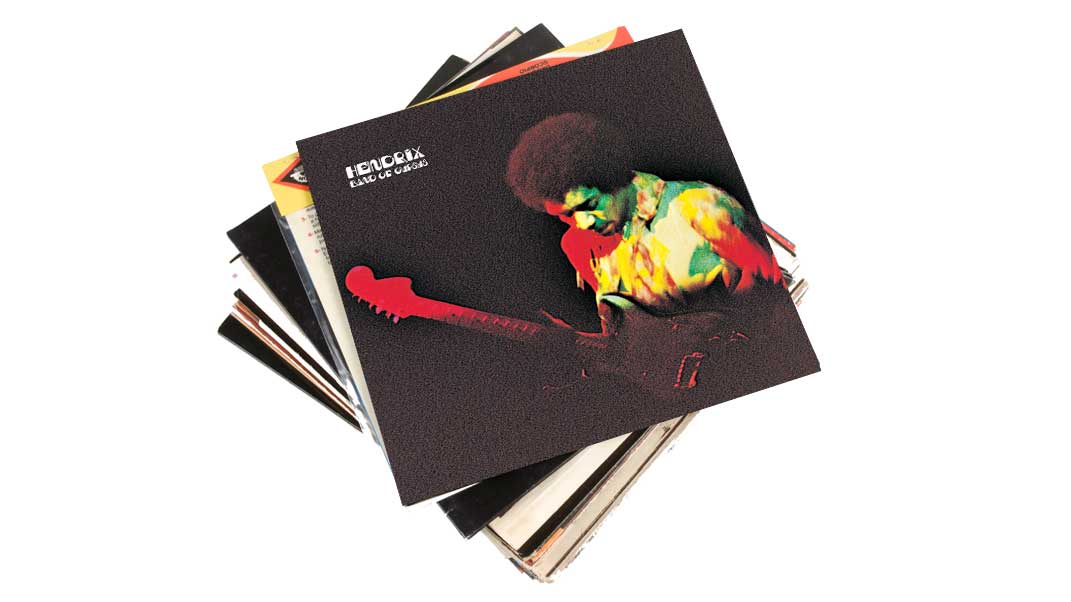
10. Jimi Hendrix - Band Of Gypsys (1970)
“As far as I’m concerned, this was his best guitar playing, recorded at Filmore East on New Year’s Eve and New Year’s Day 1970.
“The line-up was Billy Cox on bass and Buddy Miles on drums – actually, he’s a good reason to get this album. His singing was great on songs like Changes, and of course Jimi’s playing was incredible – especially on the songs Power To Love and Message To Love.
“The sound of his Strat was so wild, he’d throw it out and then pull it back. If I want to impress people with guitar playing, I’ll put it on and no-one has ever said, ‘Oh, that was shit!’ It’s always, ‘My god!’ He really was that good – even if you don’t play guitar, you know what he was doing was amazing.
“At one part, it sounds like he hits a part of his guitar and starts to tune it while it’s all feeding back… that two or three seconds of tuning really adds to the song! That’s one of my favourite live moments ever recorded.”
Amit has been writing for titles like Total Guitar, MusicRadar and Guitar World for over a decade and counts Richie Kotzen, Guthrie Govan and Jeff Beck among his primary influences. He's interviewed everyone from Ozzy Osbourne and Lemmy to Slash and Jimmy Page, and once even traded solos with a member of Slayer on a track released internationally. As a session guitarist, he's played alongside members of Judas Priest and Uriah Heep in London ensemble Metalworks, as well as handling lead guitars for legends like Glen Matlock (Sex Pistols, The Faces) and Stu Hamm (Steve Vai, Joe Satriani, G3).
